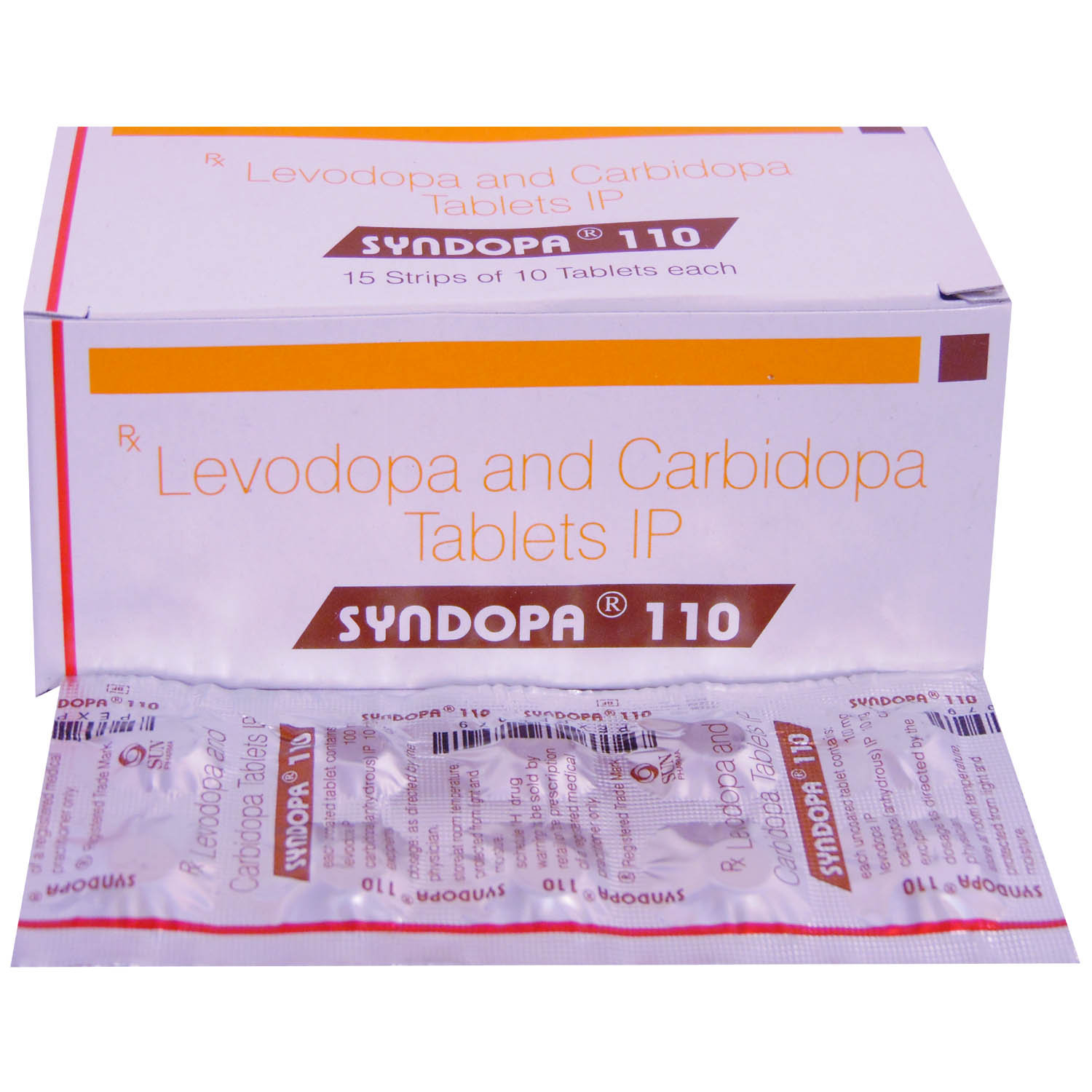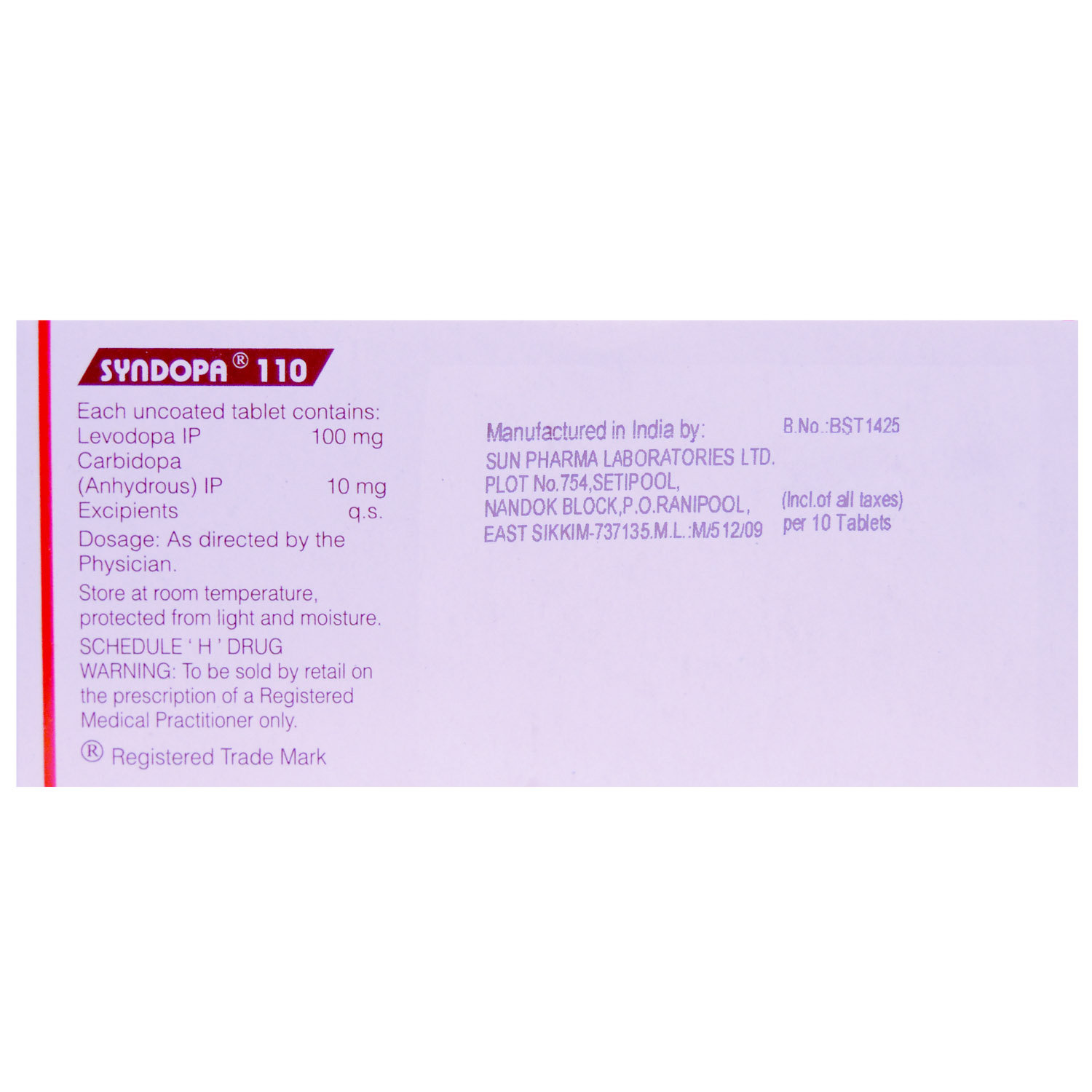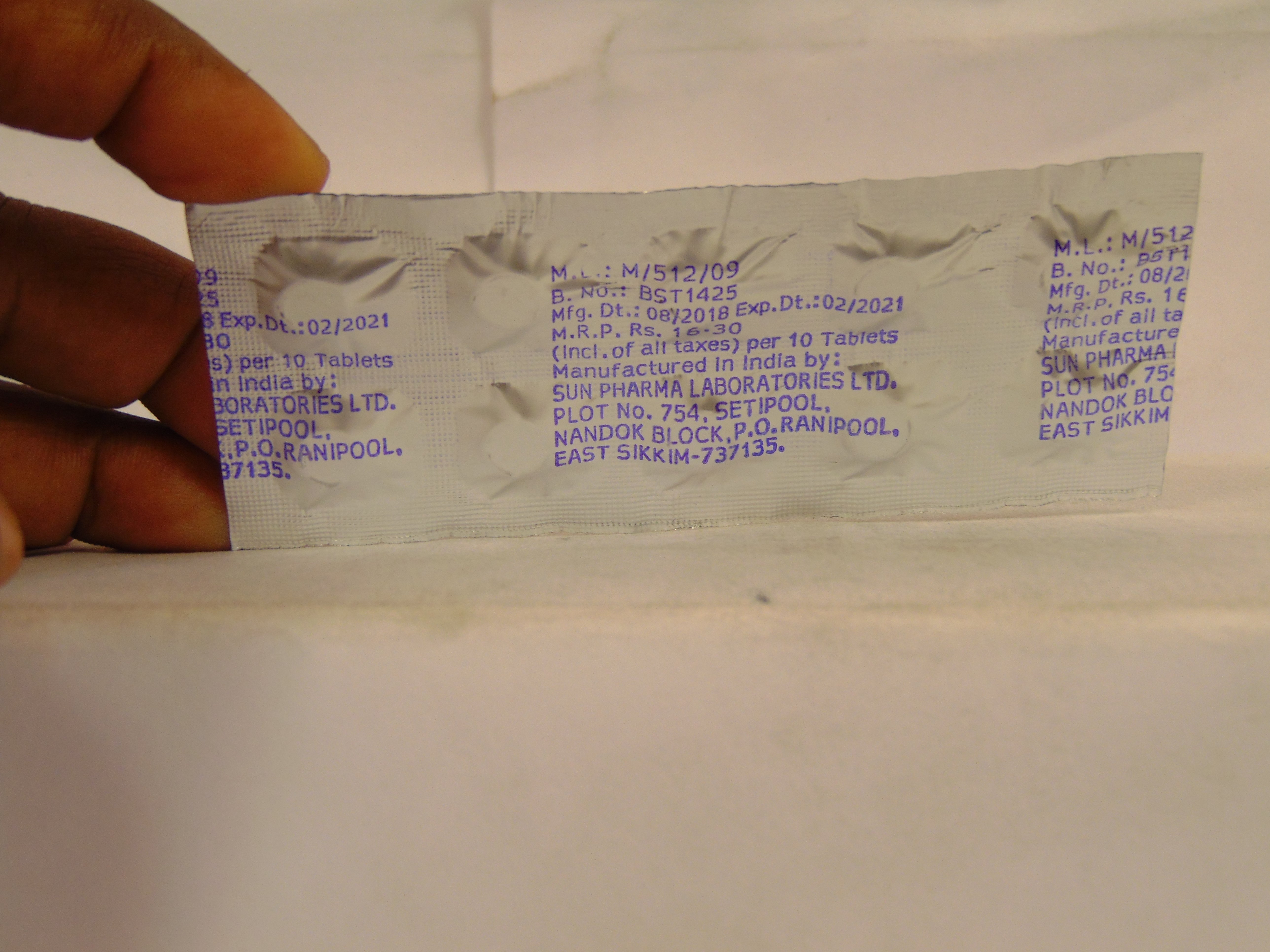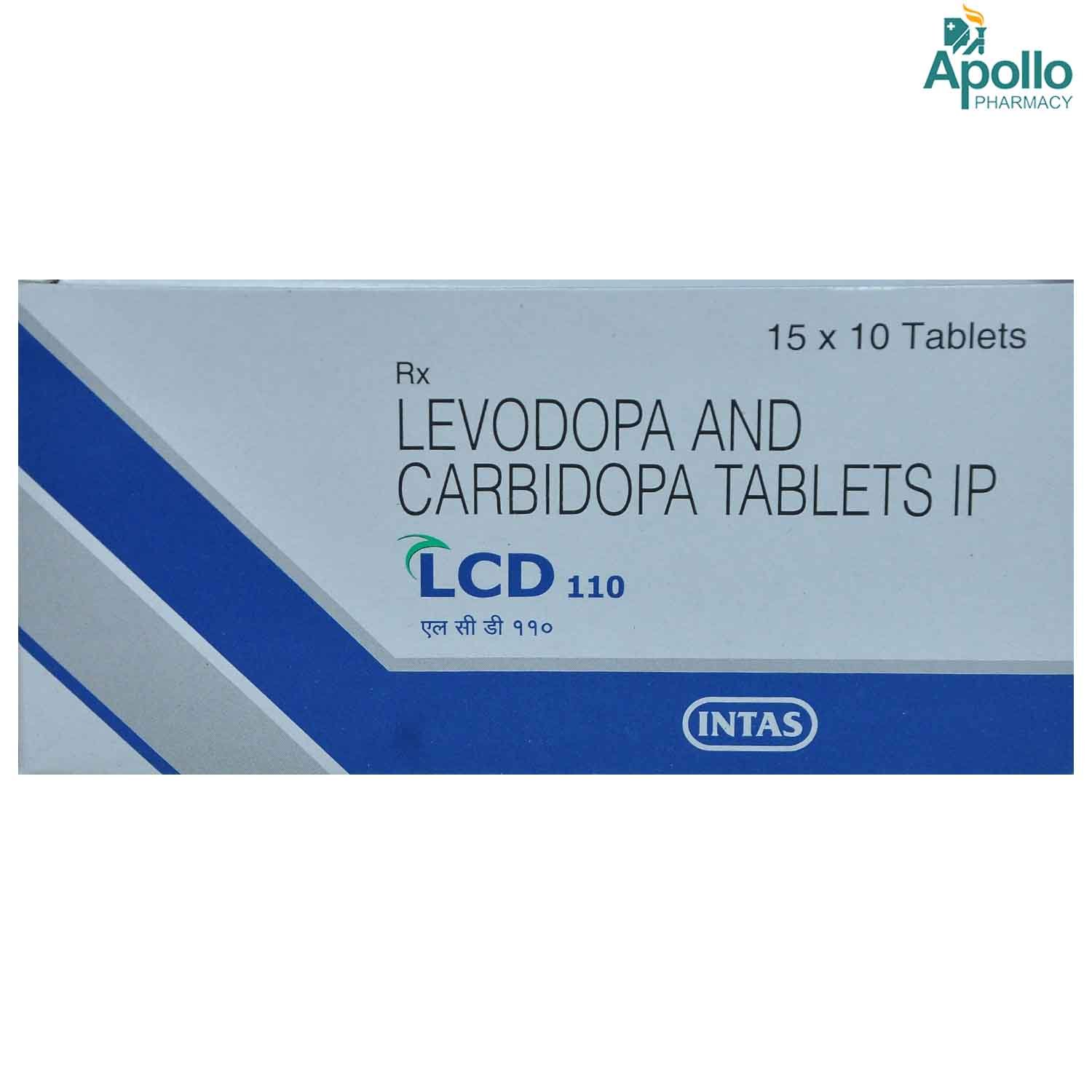Syndopa 110 Tablet 10's
MRP ₹16
(Inclusive of all Taxes)
₹2.4 Cashback (15%)
Selected Pack Size:10
10 ₹14.4
(₹1.44 per unit)
In Stock
15 ₹25.2
(₹1.68 per unit)
In Stock
Provide Delivery Location
Online payment accepted
 Prescription drug
Prescription drugWhats That
Composition :
Manufacturer/Marketer :
Consume Type :
Expires on or after :
Return Policy :
NPPA :
About Syndopa 110 Tablet
Syndopa 110 Tablet belongs to a class of drugs called 'antiparkinson agents' a precursor of dopamine (chemical messenger in the brain) primarily used in the treatment of Parkinson’s disease with its symptoms including tremors, spasms, muscle stiffness, and poor muscle control. Parkinson’s disease is a disorder of the central nervous system that affects movement and locomotion, which causes stiffness, shaking, difficulty in walking, coordination, and balance. In Parkinson's patients, there are low dopamine levels as the nerve cells of the brain (neurons) that produce dopamine begin to die.
Syndopa 110 Tablet contains 'Levodopa' and 'Carbidopa'. Levodopa belongs to the central nervous system agents, while Carbidopa is a decarboxylase inhibitor. The medicinal component Levodopa changes into dopamine in the brain and helps to control movement. Carbidopa acts by preventing the breakdown of Levodopa in the bloodstream so that more Levodopa can reach to brain.
Take Syndopa 110 Tablet as prescribed by your doctor. You are suggested to take $ame as long as your doctor has prescribed it after checking your medical condition. The most common side effects of Syndopa 110 Tablet are nausea, vomiting, loss of appetite, light-headedness, lowered blood pressure, confusion, and dyskinesia (uncontrolled/involuntary muscle movement). Most of these side effects of Syndopa 110 Tablet do not require medical attention and gradually resolve over time. However, if the side effects persist or worsen, please consult your doctor.
If you are known to be allergic to Syndopa 110 Tablet or any other medicines, please tell your doctor. Levodopa must be discontinued at least 12 hours before starting Syndopa 110 Tablet . If you are pregnant or breastfeeding, it is advised to inform your doctor. If you have glaucoma, asthma, nausea, dizziness, mental illness, breathing problems, daytime sleepiness, involuntary muscle movements, intense urges like gambling, spending money, overeating, or increased sexual urges, please inform your doctor before taking Syndopa 110 Tablet .
Uses of Syndopa 110 Tablet
Directions for Use
Key Benefits
Syndopa 110 Tablet is an antiparkinson agent that is used in the treatment of Parkinson’s disease. Syndopa 110 Tablet is a combination of two medicines, namely 'Levodopa' and 'Carbidopa'. Levodopa belongs to the class of medications name as central nervous system agents, While Carbidopa falls in decarboxylase inhibitors. The medicinal component Levodopa changes into dopamine in the brain and helps to control movement. At the same time, Carbidopa acts by preventing the breakdown of Levodopa in the bloodstream so that more Levodopa can effectively reach the brain to block acetylcholine (chemical messenger in the brain).
Storage
Drug Warnings
Tell your doctor, if you have any medical history of diabetes, heart attacks, mental illness, stomach ulcers, heart disease, or recently gone through a surgical procedure. After taking Syndopa 110 Tablet , one can feel lightheadedness, so it is advised to avoid any work that needs mental alertness. Patients taking Syndopa 110 Tablet can also have a low level of vitamin B12, increased methylmalonic acid levels. Besides this, a prolonged intake of Syndopa 110 Tablet may lead to greater neuropathy chances (nerve damage). Syndopa 110 Tablet should be given with caution in patients with eye problems (narrow-angle glaucoma), irregular heartbeat (arrhythmia), gastrointestinal bleeding, and psychosis. The use of Syndopa 110 Tablet is restricted if a person takes monoamine oxidase inhibitors (MAOs) or antidepressant drugs like isocarboxazid, phenelzine, selegiline, and tranylcypromine because it can lead to high blood pressure (hypertension) crisis.
Diet & Lifestyle Advise
- Drink plenty of water to avoid headaches due to dehydration.
- Limit the consumption of sugar-containing food or food with too many calories but fewer nutrients as it may cause tooth decay.
- Engage in physical activity like dancing or exercising, which will boost the metabolism and make a person more energetic.
- Avoid intake of alcoholic beverages with Syndopa 110 Tablet as it can make a person dehydrated and may affect their sleep. This can make it harder for a person’s body to aid the Syndopa 110 Tablet in fighting off infections.
- It is suggested to take a light meal and avoid high protein foods.
Side Effects of Syndopa 110 Tablet
- Nausea
- Vomiting
- Confusion
- Loss of appetite
- Light-headedness
- Lowered blood pressure
- Dyskinesia (uncontrolled/involuntary muscle movement)
Habit Forming
Therapeutic Class
All Substitutes & Brand Comparisons
RX
Out of StockDuodopa 100mg/10mg Tablet
Wockhardt Ltd
₹12.74
(₹1.15 per unit)
20% CHEAPERRX
Out of StockTidomet LS 10 mg/100 mg Tablet 10's
Torrent Pharmaceuticals Ltd
₹17.5
(₹1.58 per unit)
9% COSTLIERRX
Tidomet LS 10 mg/100 mg Tablet 15's
Torrent Pharmaceuticals Ltd
₹27.5
(₹1.65 per unit)
14% COSTLIER
FAQs
Drug-Drug Interactions Checker List
- RASAGILINE
- PRAMIPEXOLE
- ATORVASTATIN
- PYRIDOXINE (VITB6)
- FUROSEMIDE
- QUETIAPINE
Special Advise
- Do not exceed more than 1 dose (2 capsules) for any off period (recurring symptoms in between regular doses).
- If you have unusual urges like gambling, spending money, overeating or increased sexual urges, please inform your doctor before taking Syndopa 110 Tablet .
- Levodopa must be discontinued at least 12 hours before starting Syndopa 110 Tablet .
- Take this medication separately by as many hours as required from any iron supplements or products that are rich in iron. Intake of iron can reduce the absorption of the medication.
Disease/Condition Glossary
Parkinson's disease: It is a disorder of the central nervous system that affects movement due to damage of nerve cells in the brain which reduces the levels of dopamine and leads to symptoms such as stiffness, tremor in one hand, shaking, difficulty in walking, coordination, and balance. If proper treatment is not provided at the right time, then symptoms may worsen with time. This condition can last for many years or life-long. The symptoms of Parkinson's include- tremors in hands, reduced feeling of coordination and balance of the body, change in posture, tremors in voice, sense of smell, and sleeping problems. Other common signs and symptoms include constipation, skin problems, sleep disorders, and trouble chewing, and swallowing. Usually, most people misunderstood the early signs of Parkinson's disease as normal signs of aging and they did not seek medical help. However, treatment at the early stage of this disease is more effective and helpful.

Have a query?
Alcohol
Safe if prescribed
Avoid consumption of alcohol with Syndopa 110 Tablet as it may increase the risk of adverse effects such as drowsiness, dizziness or difficulty in concentrating.
Pregnancy
Consult your doctor
Syndopa 110 Tablet is a Category B pregnancy drug and is given to a pregnant woman only if the doctor thinks benefits outweigh risks.
Breast Feeding
Consult your doctor
Syndopa 110 Tablet is excreted in human milk, but the effect of Syndopa 110 Tablet on an infant is unknown. So, Syndopa 110 Tablet is given to a breastfeeding mother only if the doctor thinks benefits outweigh risks.
Driving
Safe if prescribed
Syndopa 110 Tablet may cause drowsiness and make you fall asleep suddenly. Therefore, avoid driving if you feel drowsy after taking Syndopa 110 Tablet .
Liver
Consult your doctor
Take Syndopa 110 Tablet with caution, especially if you have a history of Liver diseases/conditions. The dose may be adjusted by your doctor as required.
Kidney
Consult your doctor
Take Syndopa 110 Tablet with caution, especially if you have a history of Kidney diseases/conditions. The dose may be adjusted by your doctor as required.
Children
Safe if prescribed
Syndopa 110 Tablet is not recommended for children as the safety and efficacy were not established.
Recommended for a 30-day course: 5 Strips













